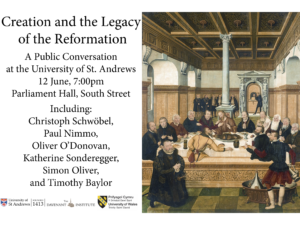Dr. Tim Baylor on the Upcoming Symposium on Creation and the Reformation
We are excited about the upcoming symposium entitled Creation and the Legacy of the Reformation. Join us on June 12 at 7 pm in Parliment Hall for an exciting night.
Dr. Timothy Baylor, Lecturer in Theology and Religious Studies at University of Wales Trinity Saint David, recently sat with Jared Michelson to answer questions about the event. Jared is presently a PhD candidate in St. Mary’s College. The questions presented in bold are Jared’s; Dr. Baylor’s responses appear underneath. We appreciate the work that both of them have put into this project.
The doctrine of creation in particular seems to be an issue of increasing importance in contemporary dogmatics. Why choose the doctrine of creation as the theme of the symposium?
Some of today’s most important theological conversations circulate around the doctrine of creation in one respect or another. Pressing practical issues pertaining to matters of ecology, sexual ethics, and economics all fundamentally depend on decisions made in the theology of creation. The doctrine also proves to be decisive for a number of issues at a higher theoretical level — such as the nature of God’s freedom and perfections, the conditions of human flourishing, and the place of human action in the work of salvation. All of these are topics of fundamental and perennial theological interest, and all of them have important conceptual correlates in this doctrine.
Why frame the symposium around a discussion of Protestantism and the doctrine of Creation?
In recent years, a number of works have been published implicating Protestant theology in the widespread agnosticism and atheism of our time. The story goes something like this:
Contemporary atheism and agnosticism is the result of a disenchanted view of the natural world. Generations before us conceived of creation as being radically dependent upon God, and so as participating in God’s power. Accordingly, they were able to discern God’s presence and action within the natural order. We, by contrast, presume the natural order to be self-moving and self-sustaining — the kind of thing that requires God’s intervention only in the most exceptional circumstances. This view of the natural order stems from a theology of creation in which God’s action is always interruptive in nature — breaking in from the outside. Though this theology had its genesis in the late Medieval Nominalists, the Reformers implicitly adopted this vision of nature as a means of critiquing Catholic theologies of mediation. The Reformation thus became a vehicle for spreading this nominalistic theology of creation. Though contrary to the intentions of the Reformers themselves, they served as accelerants of the entrenched skepticism and deism of the Enlightenment because they lacked a theology capable of affirming the participation of the natural order in God.
Of course, genealogies such as these are not strictly impartial. Often they are oriented by a very definite theological vision and serve as a means of discerning the causes of that vision’s decline. To the degree that this is the case, these genealogies function to narrate the drama of our culture’s engagement with God, or, in this case, what John Webster once called the “spiritual history of [its] neglect”.[1]This, of course, is not new. In some ways, these narratives function similarly to the types of historical narratives that the Reformers often gave, in which the Reformation is depicted as an advent of God’s grace and mercy standing at the end of a long season of spiritual decline.
That indicates, I think, that what is called for here is not simply a return to the history of the early Modern or Enlightenment periods to inspect the faithfulness of this narrative, though certainly that too is warranted. I think it also calls for a properly theological reflection — one that contemplates the normative question: Is there a Protestant doctrine of creation, and if so, how should it function?
The symposium includes a fascinating line-up of theologians, who come from a variety of divergent theological perspectives. What motivated the invitation of these particular participants?
We are very fortunate to have such a gifted group of people to be part of this conversation. Each of our participants is known for his or her contributions to the study of theology. All of them have written on the doctrine of creation or topics closely adjacent to the doctrine. And it was important for us to have a variety of different voices represented as part of this conversation. This is a topic on which there are no easy answers. You expect Reformed, Lutheran, Anglican, and Catholic thinkers disagree with one another, but on a topic like this one, it is just as common for them to disagree amongst themselves. In order to move the conversation forward, in other words, it is crucial that we skillfully engage a variety of different perspectives. And each of our participants have a long history of doing just that.
